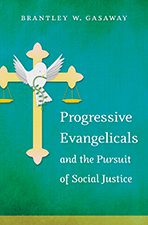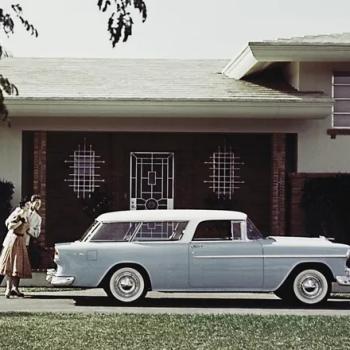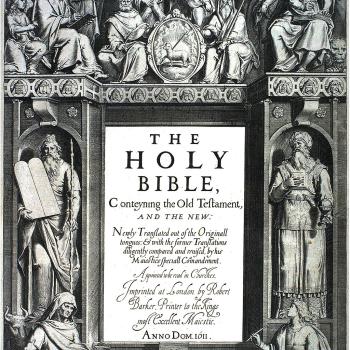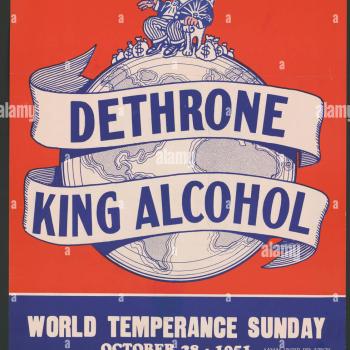This is Part II of an interview with Brantley Gasaway, author of a just-released book entitled Progressive Evangelicals and the Pursuit of Social Justice. If you order it now, you should get a copy in the next couple of weeks.
***
Swartz: You orient the mission of progressive evangelicals around the concept of a “public theology of community.” What do you mean by that?
Gasaway: Let me first explain why I focus on progressive evangelicals’ public theology. My work addresses and analyzes a range of historical forces (e.g. social, political, cultural) that shaped the public engagement of progressive evangelicals. But I also believe that it was essential to identify the “public theology”—that is, the set of theological convictions concerning public affairs, politics, and a just society—that inspired their activism. As evangelicals, the leaders of Sojourners, Evangelicals for Social Action (ESA), The Other Side, and others in the evangelical left claimed that their unusual combination of political and social positions represented faithful applications of biblical principles and paradigms. To be sure, I indicate in several places how progressive evangelicals’ theological positions were affected by broader cultural forces. Nevertheless, I argue that we can best analyze the distinctive political praxis of the contemporary progressive evangelical movement—and best understand what distinguished it from both the Religious Right and political left—by identifying the underlying and often implicit public theology developed by prominent leaders such as Jim Wallis and Ron Sider.
 These leaders insisted that the biblical connotations of “community” set the terms for justice in the public sphere. God creates humans not only as sacrosanct and equal individuals, they claimed, but also as interdependent communal beings with public (and not merely personal) responsibilities for each other’s welfare. Because justice provides the vital framework for determining the balancing between individual rights and the common good, progressive evangelicals regarded it as the highest ideal of public life. They insisted that the biblical vision for social justice requires substantively equal opportunities for all community members that depend upon the just distribution of socioeconomic resources. Leaders viewed the state as the organized political community, and therefore they argued that the government rightly fosters social justice by adopting policies that promote distributive justice.
These leaders insisted that the biblical connotations of “community” set the terms for justice in the public sphere. God creates humans not only as sacrosanct and equal individuals, they claimed, but also as interdependent communal beings with public (and not merely personal) responsibilities for each other’s welfare. Because justice provides the vital framework for determining the balancing between individual rights and the common good, progressive evangelicals regarded it as the highest ideal of public life. They insisted that the biblical vision for social justice requires substantively equal opportunities for all community members that depend upon the just distribution of socioeconomic resources. Leaders viewed the state as the organized political community, and therefore they argued that the government rightly fosters social justice by adopting policies that promote distributive justice.
I devote a separate chapter to explicating progressive evangelical leaders’ “public theology of community,” and I analyze how they challenged the individualistic foundations and secular expectations of forms of political liberalism associated with advocates ranging from John Locke to John Rawls. In subsequent thematic chapters, I demonstrate how progressive evangelicals’ political priorities and anomalous combination of positions represented the application of this underlying public theology of community. Based upon their interpretation of social justice, leaders championed issues and promoted public policies designed to ensure the substantive equality, socioeconomic rights, and peaceful welfare of all of their communal “neighbors” within the United States and beyond.
Swartz: Your chapters are organized topically around subjects such as racism, war and peace, homosexuality, feminism, abortion, and poverty. Which one of them was the most difficult to write—and why?
Gasaway: In many respects, the most challenging chapter was the one on poverty and economic justice. Progressive evangelical leaders addressed this topic more frequently and more forcefully than any other. I felt as if I could have developed a book-length study of this single issue, for I had to work through hundreds and hundreds of articles, scores of books, and other relevant sources. But leaders’ writing on economic justice differed not only in quantity but also in quality—they more regularly included biblical exegeses and explicit theological deliberations. As a result, my chapter on poverty and economic justice is the only one in which I have an entire section that summarizes and systematizes progressive evangelicals’ theology on a particular theme. Finally, I found this chapter difficult because of my previous unfamiliarity with economic debates in general and in particular over the past four decades. But because economic justice was at the core of progressive evangelicals’ public theology and political engagement, it was a rewarding one to write.
Swartz: Which of these chapters do you think might generate the most discussion or debate?
Gasaway: My chapters are like my children—I love them all equally, and I hope they all receive their due attention.
But because of contemporary controversies and debates, I imagine that many readers will be drawn to my chapter on how progressive evangelicals responded to gay and lesbian issues—not only within the church but also regarding civil rights and marriage. The Other Side magazine, which adopted an affirming position in the early 1980s, foreshadowed many of the current arguments that are being made by people such as Matthew Vines and Justin Lee for the full inclusion of LGBT individuals within churches. Readers sympathetic to this position—or even those reconsidering traditional teachings on same-sex relationships—may view The Other Side’s leaders as courageous pioneers but be sobered by how almost all evangelicals subsequently shunned them. In contrast, both ESA and initially Sojourners developed the type of welcoming but not affirming position that recently appears to have become rhetorically popular within many evangelical circles. Not least, in the midst of broader trends in American culture, many evangelicals may be interested in learning (positively or negatively) from the examples of ESA and Sojourners in the 1990s and early 2000s as they struggled to determine if their commitment to gay civil rights required them to support public (but not religious) recognition of same-sex marriages.
Swartz: What are you working on now?
Gasaway: In the short term, I am working on an article that expands my analysis of how progressive evangelicals challenged most Americans’ (and, indeed, most evangelicals’) staunch support for the modern state of Israel—a topic that I had to condense into about five pages in my book, in the context of the 1991 Gulf War. But I believe that this issue merits more attention, and I want to contextualize my analysis within broader considerations of the influence of religion on American foreign policy.
I am also developing a longer research project on two aspects of Christian homeschooling. First, I want to study the most popular religiously inspired curricula used by many homeschooling families. The production and distribution of textbooks and curricula for homeschooling is a billion dollar industry that is essential to the movement. Without these prepared materials, many homeschooling parents, who rarely have training in education or child development, would struggle to develop a structured educational program for their children. Second, I believe that focusing on the advocacy and apologetic work of the Home School Legal Defense Association (HSLDA) offers an important lens for interpreting the ways in which Christian homeschooling has created public debates and produced legal controversies regarding religious freedoms in recent decades. Founded in 1983 and led most prominently by Michael Farris, HSLDA has arguably wielded the most organizational power within the Christian homeschool movement. As a result, it has shaped both the internal practices and public perceptions of Christian homeschooling.












